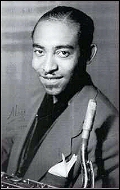 |
Don ByasTenor Saxophone |
|---|
 |
Don ByasTenor Saxophone |
|---|
"Years ago the game was vicious, cutthroat. Can you imagine Lester Young, Coleman Hawkins, Chu Berry, Don Byas, and Ben Webster on the same little jam session? And guess who won the fight? That's what it was--a saxophone duel. Don Byas walked off with everything."
--Sonny Stitt
When he left for Europe in the fall of 1946 with the Don Redman band, Don Byas' reputation was at its peak. Admired by the modernists at Minton's no less than by the swing-styled players of his own generation on 52nd Street, he was celebrated as a tireless, original and influential saxophonist. His solo on Basie's "Harvard Blues" had created a stir in 1941 and he followed it with a remarkable series of recordings for small labels. In his romantic approach to "Laura," he had something of a hit.
He stayed in Europe, becoming the first in a continuously expanding family of expatriate jazzmen, and although the great Don Byas was much in demand by the jazz-appreciative Europeans, he was largely forgotten back home. Few of his records were available here and without personal appearances it is difficult, if not impossible, to sustain a following. He returned to the U.S. once, in the summer of 1970, received little of the money or adulation he might have expected, and returned to Holland where he died in August 1972 of lung cancer. He was 59.
Don Byas was a seminal figure in the development of the tenor saxophone and a transitional one twixt the schools of swing and bop. Born in Muskogee, Oklahoma, in 1912, he played alto as a teenager, subbing in territorial bands like Bennie Moten's and Walter Page's Blue Devils. As a student at Langston College, he led his own band, Don Byas and the Collegiate Ramblers. Between 1933, when he switched to tenor, and 1941, he worked with a variety of bands, first in California and then New York--among them: Buck Clayton, Lionel Hampton, Eddie Barefield, Eddie Mallory, Lucky Millinder, Andy Kirk and Redman. In January '41, he became Lester Young's successor in the Count Basie band and quickly established his abilities, cementing his reputation.
Byas' style evolved in the lush, rococo, full-bodied tenor tradition of Coleman Hawkins, but his sound was unmistakably his own, immediately recognizable. A master of technique, he accomplished both the tenderest warmth and the most strident sting. His sense of drama coupled with a brilliant use of dynamics and timbre, a deeply-felt romanticism--which on occasion dripped into sentimentality, his worst pitfall--and an unsurpassable sense of swing made his improvisations unique.
Byas was a masterful swing player with his own style, an advanced sense of harmony, and a confidence and adventurousness that found him hanging around the beboppers and asking to play. He held his own and did so while insistently remaining himself: he never picked up the rhythmic phrases, the lightning triplets, that are indigenous to bop. Yet Charlie Parker said of him that Byas was playing everything there was to play.
--GARY GIDDINS, from the liner notes,
A Tribute To Cannonball, Columbia.
A selected discography of Don Byas albums.
| Find Don Byas on Amazon.com | Find Don Byas on eBay.com | |
|---|---|---|
| Don Byas CDs on Amazon | Don Byas CDs on eBay | |
| The Jazz Exiles, BOOK, 1993 | Don Byas LPs on eBay | |
| Don Byas DVD / VHS on eBay | ||
| Don Byas BOOKs on eBay |
 Music |
 Home |
 Musicians |
|---|
|
Any comments, additions or suggestions should be adressed to:
The Hard Bop Homepage / Eric B. Olsen / ebolsen@juno.com |
Other Web Sites:
The Film Noir 'net A History of Horror The War Film Web Author Eric B. Olsen |